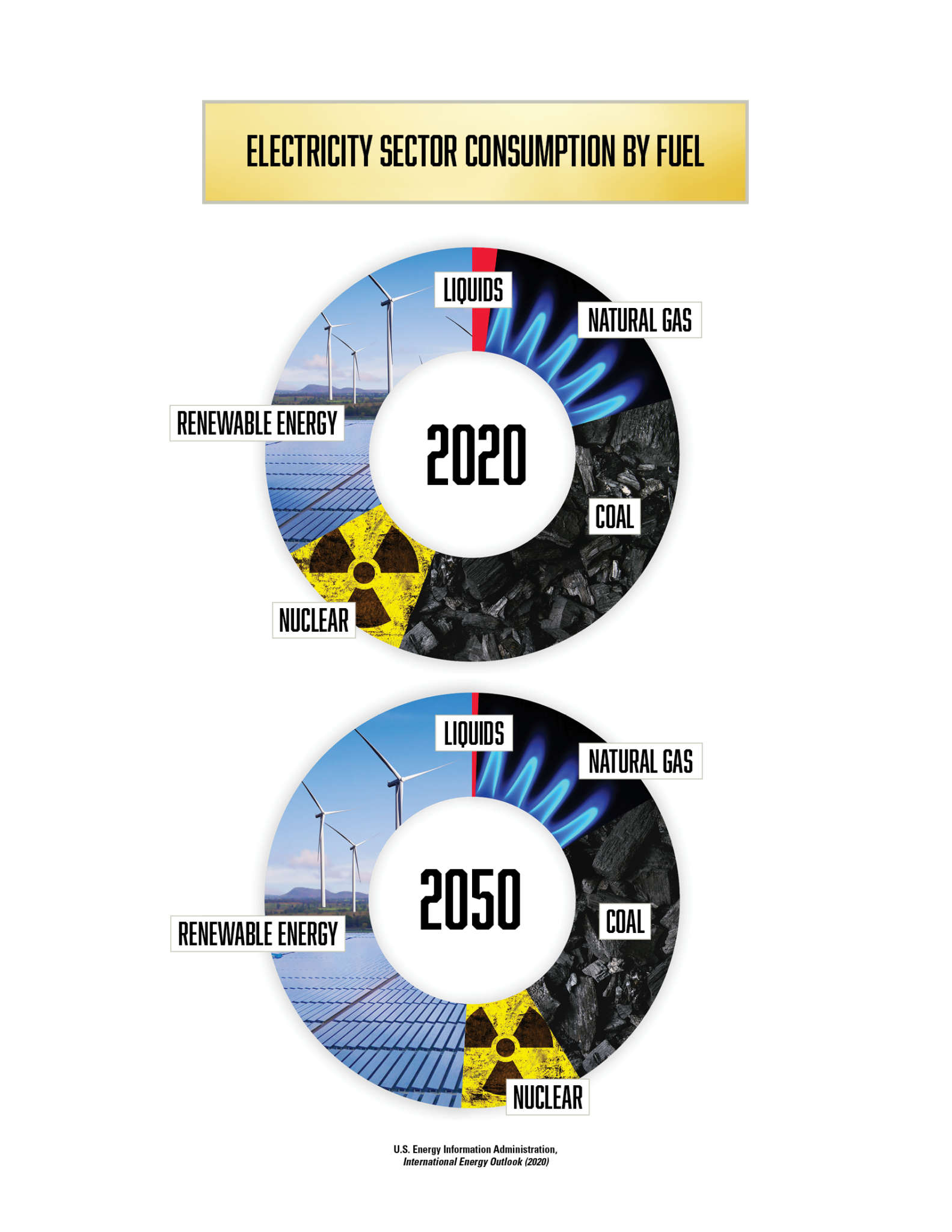The massive Golden Driller statue on the grounds of Tulsa’s Expo Square is an iconic symbol of the city’s long connection to oil and gas extraction, processing and distribution. For more than a century, The University of Tulsa has educated students for careers in the fossil-fuel sector. This work continues to be a major focus of the school’s curriculum at both the undergraduate and graduate levels and is expected to remain robust for many years to come.
 Jurisdictions around the world are phasing out coal-fired power generation; the demand for oil is predicted to spiral downward; corporations are diversifying toward renewable, sustainable power (e.g., Shell is ramping up wind, solar and related technologies, while General Motors has its sights fixed on electric vehicles); and the U.S. Energy Information Administration foresees nearly 49% of the world’s electricity production arising from renewable energy by 2050.
Jurisdictions around the world are phasing out coal-fired power generation; the demand for oil is predicted to spiral downward; corporations are diversifying toward renewable, sustainable power (e.g., Shell is ramping up wind, solar and related technologies, while General Motors has its sights fixed on electric vehicles); and the U.S. Energy Information Administration foresees nearly 49% of the world’s electricity production arising from renewable energy by 2050.
With all this change in the air, how are energy-focused business studies evolving at TU? More to the point, how is Collins College of Business preparing its graduates to be leaders in the emerging clean energy economy?
Global shifts, curricular innovations
Growing worldwide interest in energy sustainability is a powerful catalyst for the recent changes within the university’s academic programming. “As people involved in energy sustainability,” explained Tom Seng, director of TU’s School of Energy Economics, Policy & Commerce, “our work entails looking at domestic and global energy demand as well as the existing portfolio of energy supplies. Then, we research how the future will look in terms of both of these.”

Most recently, Seng pointed out, there has been a precipitous drop in oil prices caused by reduced consumer demand wrought by COVID-19. Calling it a “dramatic shift for the industry,” Seng does not believe demand will ever return to a pre-pandemic level. “I also believe there will be a massive reset in terms of how U.S. companies look at their energy portfolios. This will favor alternative/renewable energy from both a cost and image perspective. The picture developing is one of a gradual, but steady, move away from fossil fuels toward more ‘green’ forms of energy.”
In response to these developments and forecasts, in fall 2020, TU’s Energy Management program, which is one of only nine such programs in the United States, introduced a new curriculum that includes topics such as climate change and alternative/renewable electricity sources. The university also freed-up more electives for students so they could sample a wider variety of energy topics within the major.
“These innovations mean we now can deliver truly comprehensive energy management content, covering alternative/renewable energy,” said Seng. “That’s in addition to addressing demand-side management, demand responses, distributed generation and sustainability.” While these courses, including an internship, are now on the books, the initial students will not actually begin enrolling in them until fall 2021.
Campus-wide sustainability
Beyond academics, TU has a robust commitment to sustainability. Various sustainability projects have been accomplished while others are being implemented and planned across the institution. TU is also a member of Sustainable Tulsa and the School of Energy Economics, Policy & Commerce prepared that organization’s Scor3card assessment in 2019, which is an online sustainability tracking and assessment tool for organizations that want to track and improve their sustainability plans.
One of the most vivid of TU’s sustainability projects is the solar power installation at the Michael D. Case Tennis Center. In 2016, 936 polycrystalline photovoltaic panels – half facing east and half facing west – were installed on the building’s roof. This 300-kilowatt system is owned by PSO and leased by TU, and the electricity it generates powers the Case Center. “That is not only a sustainable form of power but also nets some cost savings that represent financial sustainability for the university,” Seng said. “These days, the two forms of sustainability go hand in hand.”
The Energy Management program’s curricular change is highly appealing to first-year student Luis Salazar. Hailing from Houston, Texas, Salazar is majoring in energy management and finance. “The world is shifting away from oil, gas and coal to cleaner fuels, and the next big revolution in the energy market is all about renewable and alternative resources,” he said. “It’s going to be a multibillion-dollar market that will create thousands of jobs. Getting to learn about these innovations while I’m at TU will help to prepare me for a career as either a landman or a commodity trader involved in alternative/renewable energy.”

At the graduate level, the university offers the online Master of Energy Business (MEB) program, which delivers training in management, business skills and energy company operations. “It’s essentially an MBA program infused with energy content,” Seng observed, “and it’s aimed primarily at people who are already working in the industry.” The MEB’s curriculum includes two courses dealing with alternative/renewable energy: the Business of Renewable Energy and Alternative Fuels (required) and the Electric Utility Industry and Demand Management (elective).
Sustainable energy and careers

Helping to chart that program’s future is Bethany Johns, who completed her MEB at TU in 2016 and then went on to earn her doctor of management degree with a concentration in environmental and social sustainability at Colorado Technical University. “No other program compares to TU’s MEB program,” said Johns, who is now a visiting professor at TU. “Where else can one obtain a higher education degree online that serves to build a business management foundation, with a focus on the energy industry, while being relevant to current needs in the professional practice?” Most of all, she noted, TU’s MEB is functional and practical, with students developing transferable skills and knowledge that give them immense career versatility.
In addition to teaching in the MEB program, Johns is part of the team helping to chart the program’s way forward toward a focus on sustainability and renewable/alternative energy. “While the oil industry is far from being eliminated from North America, it’s clear that the focus on alternative fuels and renewable energy will continue to rise across the globe,” she said.
Believing that academia must remain abreast of these changes, for Johns it is “our duty to current and future students to continually enhance our programming. By doing so, our graduates will be prepared both to enter the workforce and continue learning and thriving throughout their careers.”
Career sustainability through learning about sustainable energy: a TU innovation aimed at changing the world.
Look to the future – yours and the planet’s – and consider gaining a high-quality, energy-focused business education with The University of Tulsa’s School of Energy Economics, Policy and Commerce.






